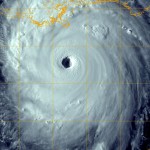Hurricane Katrina
January 19, 2012 by staff · Comments Off on Hurricane Katrina
 Hurricane Katrina, Hurricane Katrina was the deadliest and most destructive Atlantic hurricane of the 2005 Atlantic hurricane season. It is the costliest natural disaster, as well as one of the five deadliest hurricanes, in the history of the United States. Among recorded Atlantic hurricanes, it was the sixth strongest overall. At least 1,836 people died in the actual hurricane and in the subsequent floods, making it the deadliest U.S. hurricane since the 1928 Okeechobee hurricane; total property damage was estimated at $81 billion (2005 USD), nearly triple the damage wrought by Hurricane Andrew in 1992.
Hurricane Katrina, Hurricane Katrina was the deadliest and most destructive Atlantic hurricane of the 2005 Atlantic hurricane season. It is the costliest natural disaster, as well as one of the five deadliest hurricanes, in the history of the United States. Among recorded Atlantic hurricanes, it was the sixth strongest overall. At least 1,836 people died in the actual hurricane and in the subsequent floods, making it the deadliest U.S. hurricane since the 1928 Okeechobee hurricane; total property damage was estimated at $81 billion (2005 USD), nearly triple the damage wrought by Hurricane Andrew in 1992.
Hurricane Katrina formed over the Bahamas on August 23, 2005 and crossed southern Florida as a moderate Category 1 hurricane, causing some deaths and flooding there before strengthening rapidly in the Gulf of Mexico. The storm weakened before making its second landfall as a Category 3 storm on the morning of Monday, August 29 in southeast Louisiana. It caused severe destruction along the Gulf coast from central Florida to Texas, much of it due to the storm surge. The most significant number of deaths occurred in New Orleans, Louisiana, which flooded as the levee system catastrophically failed, in many cases hours after the storm had moved inland. Eventually 80% of the city and large tracts of neighboring parishes became flooded, and the floodwaters lingered for weeks. However, the worst property damage occurred in coastal areas, such as all Mississippi beachfront towns, which were flooded over 90% in hours, as boats and casino barges rammed buildings, pushing cars and houses inland, with waters reaching 6-12 miles (10-19 km) from the beach.
The hurricane surge protection failures in New Orleans are considered the worst civil engineering disaster in U.S history and prompted a lawsuit against the US Army Corps of Engineers (USACE), the designers and builders of the levee system as mandated by the Flood Control Act of 1965. Responsibility for the failures and flooding was laid squarely on the Army Corps in January 2008 by Judge Stanwood Duval, US District Court, but the federal agency could not be held financially liable due to sovereign immunity in the Flood Control Act of 1928. There was also an investigation of the responses from federal, state and local governments, resulting in the resignation of Federal Emergency Management Agency (FEMA) director Michael D. Brown, and of New Orleans Police Department (NOPD) Superintendent Eddie Compass.
Several agencies including the United States Coast Guard (USCG), National Hurricane Center (NHC), and National Weather Service (NWS) were commended for their actions. They provided accurate hurricane weather tracking forecasts with sufficient lead time. Unfortunately, even the most insistent appeals from national, state and local public officials to residents to evacuate before the storm did not warn that the levees could breach and fail.
Struck By Hurricane
January 19, 2012 by staff · Comments Off on Struck By Hurricane
Struck By Hurricane, Hurricane Floyd was the sixth named storm, fourth hurricane, and third major hurricane in the 1999 Atlantic hurricane season. Floyd triggered the third largest evacuation in US history (behind Hurricane Gustav and Hurricane Rita, respectively) when 2.6 million coastal residents of five states were ordered from their homes as it approached. The Cape Verde-type hurricane formed off the coast of Africa and lasted from September 7 to September 19, peaking in strength as a very strong Category 4 hurricane-just short of the highest possible rating-on the Saffir-Simpson Hurricane Scale. It was among the largest Atlantic hurricanes of its strength ever recorded.
Floyd struck The Bahamas at peak strength, causing heavy damage. It then paralleled the East Coast of the United States, causing massive evacuations and costly preparations from Florida through the Mid-Atlantic states. The storm weakened significantly, however, before making landfall in North Carolina as a Category 2 hurricane, and caused further damage as it traveled up the Mid-Atlantic region and into New England.
The hurricane produced torrential rainfall in eastern North Carolina, adding more rain to an area hit by Hurricane Dennis just weeks earlier. The rains caused widespread flooding over a period of several weeks; nearly every river basin in the eastern part of the state exceeded 500-year flood levels. In total, Floyd was responsible for 57 fatalities and $4.5 billion (1999 USD; $5.93 billion 2012 USD) in damage.
Kanye West On Today
January 9, 2012 by staff · Comments Off on Kanye West On Today
 Kanye West On Today, NBCThe Today show interview that Kanye West called “VERY BRUTAL” on Twitter yesterday aired in part today, letting the world see the exchange that made West tweet, “I feel very alone very used very tortured very forced very misunderstood very hollow very very misused.”
Kanye West On Today, NBCThe Today show interview that Kanye West called “VERY BRUTAL” on Twitter yesterday aired in part today, letting the world see the exchange that made West tweet, “I feel very alone very used very tortured very forced very misunderstood very hollow very very misused.”
After introducing the segment this morning, Today host Matt Lauer played West’s remarks about accusing George W. Bush of racism after Hurricane Katrina in 2005. “As far as it being the worst moment of his presidency, you know, I can’t really speak to that,” the rapper said. “But his take, his explanation, I completely agree with and I empathize with totally.”
The trouble in their interview began a moment later, when the Today show cued footage of Lauer’s recent interview with Bush. “I didn’t need you guys to show me the tape in order to prompt my emotions or whatever,” West said in an annoyed tone. “I don’t need all the jazz…Can we be quiet for a second?”
Pressed by Lauer to further explain his thoughts on the Bush incident, West went back on message. “I want to give it the exact perfect wording, because everything I say gets taken and drawn into headlines,” he noted. “I’m here to man up to different mistakes that I made, and speak to the moment when I pegged George Bush as a racist. I came here to say that I made mistakes and I’ve grown as a person.”
But when Today cued another clip of West interrupting Taylor Swift at the 2009 VMAs, he complained again. “Yo, how am I supposed to talk if you’re going to run the thing in the middle while I’m talking?…Please don’t let that happen again. It’s ridiculous.”
In this morning’s segment, Lauer defended the practice of showing old footage during interviews as standard. Watch the interview after the jump and let us know what you think: Was West right to be bothered by Lauer’s interviewing technique?



